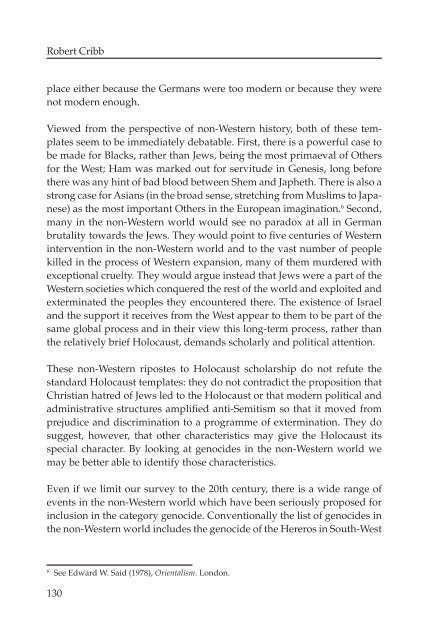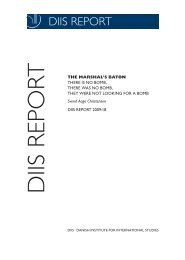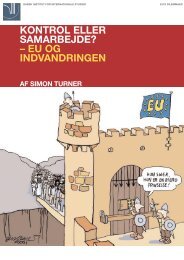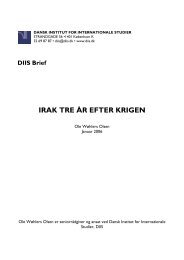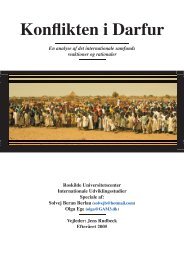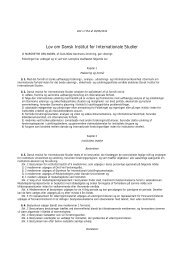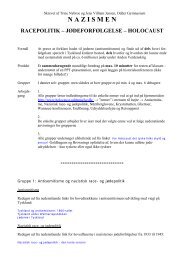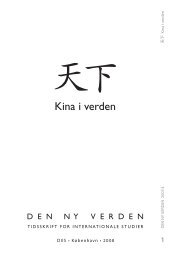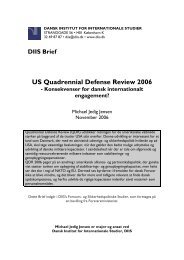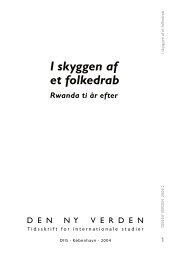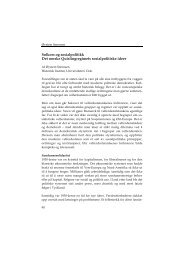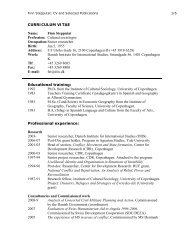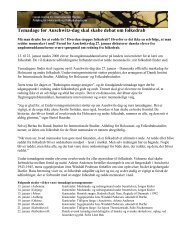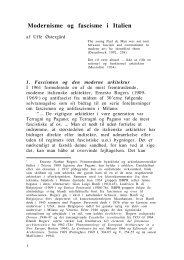- Page 1 and 2:
Genocide: Cases, Comparisons and Co
- Page 3 and 4:
Genocide: Cases, Comparisons and Co
- Page 5 and 6:
Preface With this book the Danish C
- Page 7 and 8:
Table of Contents Introduction ....
- Page 9 and 10:
Introduction Steven L. B. Jensen In
- Page 11 and 12:
Introduction As the year 1941 start
- Page 13 and 14:
Introduction During 1947 political
- Page 15 and 16:
“I believe that the nation as suc
- Page 17 and 18:
“I believe that the nation as suc
- Page 19 and 20:
“I believe that the nation as suc
- Page 21 and 22:
“I believe that the nation as suc
- Page 23 and 24:
“I believe that the nation as suc
- Page 25 and 26:
“I believe that the nation as suc
- Page 27 and 28:
“I believe that the nation as suc
- Page 29 and 30:
“I believe that the nation as suc
- Page 31 and 32:
“I believe that the nation as suc
- Page 33 and 34:
“I believe that the nation as suc
- Page 35 and 36:
“I believe that the nation as suc
- Page 37 and 38:
“I believe that the nation as suc
- Page 39 and 40:
“I believe that the nation as suc
- Page 41 and 42:
“I believe that the nation as suc
- Page 43 and 44:
“I believe that the nation as suc
- Page 45 and 46:
“I believe that the nation as suc
- Page 47 and 48:
“I believe that the nation as suc
- Page 49 and 50:
“I believe that the nation as suc
- Page 51 and 52:
“I believe that the nation as suc
- Page 53 and 54:
“I believe that the nation as suc
- Page 55 and 56:
Motives, Mechanisms and Memories of
- Page 57 and 58:
Motives, Mechanisms and Memories of
- Page 59 and 60:
Motives, Mechanisms and Memories of
- Page 61 and 62:
Motives, Mechanisms and Memories of
- Page 63 and 64:
Motives, Mechanisms and Memories of
- Page 65 and 66:
Motives, Mechanisms and Memories of
- Page 67 and 68:
Motives, Mechanisms and Memories of
- Page 69 and 70:
Motives, Mechanisms and Memories of
- Page 71 and 72:
Motives, Mechanisms and Memories of
- Page 73 and 74:
Motives, Mechanisms and Memories of
- Page 75 and 76:
Motives, Mechanisms and Memories of
- Page 77 and 78:
Motives, Mechanisms and Memories of
- Page 79 and 80: Motives, Mechanisms and Memories of
- Page 81 and 82: Motives, Mechanisms and Memories of
- Page 83 and 84: The Punjab 1937-47 - A Case of Geno
- Page 85 and 86: The Punjab 1937-47 - A Case of Geno
- Page 87 and 88: The Punjab 1937-47 - A Case of Geno
- Page 89 and 90: The Punjab 1937-47 - A Case of Geno
- Page 91 and 92: The Punjab 1937-47 - A Case of Geno
- Page 93 and 94: The Punjab 1937-47 - A Case of Geno
- Page 95 and 96: The Punjab 1937-47 - A Case of Geno
- Page 97 and 98: The Punjab 1937-47 - A Case of Geno
- Page 99 and 100: The Punjab 1937-47 - A Case of Geno
- Page 101 and 102: The Punjab 1937-47 - A Case of Geno
- Page 103 and 104: The Punjab 1937-47 - A Case of Geno
- Page 105 and 106: The Punjab 1937-47 - A Case of Geno
- Page 107 and 108: The Punjab 1937-47 - A Case of Geno
- Page 109 and 110: The Punjab 1937-47 - A Case of Geno
- Page 111 and 112: The Punjab 1937-47 - A Case of Geno
- Page 113 and 114: The Punjab 1937-47 - A Case of Geno
- Page 115 and 116: The Punjab 1937-47 - A Case of Geno
- Page 117 and 118: The Punjab 1937-47 - A Case of Geno
- Page 119 and 120: The Punjab 1937-47 - A Case of Geno
- Page 121 and 122: The Punjab 1937-47 - A Case of Geno
- Page 123 and 124: Genocide in the Non-Western World:
- Page 125 and 126: Genocide in the Non-Western World:
- Page 127 and 128: Genocide in the Non-Western World:
- Page 129: Genocide in the Non-Western World:
- Page 133 and 134: Genocide in the Non-Western World:
- Page 135 and 136: Genocide in the Non-Western World:
- Page 137 and 138: Genocide in the Non-Western World:
- Page 139 and 140: Genocide in the Non-Western World:
- Page 141 and 142: Comparing the Killing Fields: Rwand
- Page 143 and 144: Comparing the Killing Fields: Rwand
- Page 145 and 146: Comparing the Killing Fields: Rwand
- Page 147 and 148: Comparing the Killing Fields: Rwand
- Page 149 and 150: Comparing the Killing Fields: Rwand
- Page 151 and 152: Comparing the Killing Fields: Rwand
- Page 153 and 154: Comparing the Killing Fields: Rwand
- Page 155 and 156: Comparing the Killing Fields: Rwand
- Page 157 and 158: Comparing the Killing Fields: Rwand
- Page 159 and 160: Comparing the Killing Fields: Rwand
- Page 161 and 162: Comparing the Killing Fields: Rwand
- Page 163 and 164: Comparing the Killing Fields: Rwand
- Page 165 and 166: Comparing the Killing Fields: Rwand
- Page 167 and 168: Comparing the Killing Fields: Rwand
- Page 169 and 170: Comparing the Killing Fields: Rwand
- Page 171 and 172: Comparing the Killing Fields: Rwand
- Page 173 and 174: Comparing the Killing Fields: Rwand
- Page 175 and 176: Holocaust, Genocide and European Va
- Page 177 and 178: Holocaust, Genocide and European Va
- Page 179 and 180: Holocaust, Genocide and European Va
- Page 181 and 182:
Holocaust, Genocide and European Va
- Page 183 and 184:
Holocaust, Genocide and European Va
- Page 185 and 186:
Holocaust, Genocide and European Va
- Page 187 and 188:
Holocaust, Genocide and European Va
- Page 189 and 190:
Holocaust, Genocide and European Va
- Page 191 and 192:
Holocaust, Genocide and European Va
- Page 193 and 194:
Turkey, the US and the Armenian Gen
- Page 195 and 196:
Turkey, the US and the Armenian Gen
- Page 197 and 198:
Turkey, the US and the Armenian Gen
- Page 199 and 200:
Turkey, the US and the Armenian Gen
- Page 201 and 202:
Turkey, the US and the Armenian Gen
- Page 203 and 204:
Turkey, the US and the Armenian Gen
- Page 205 and 206:
Turkey, the US and the Armenian Gen
- Page 207 and 208:
Turkey, the US and the Armenian Gen
- Page 209 and 210:
Turkey, the US and the Armenian Gen
- Page 211 and 212:
Turkey, the US and the Armenian Gen
- Page 213 and 214:
Turkey, the US and the Armenian Gen
- Page 215 and 216:
Turkey, the US and the Armenian Gen
- Page 217 and 218:
Turkey, the US and the Armenian Gen
- Page 219 and 220:
Turkey, the US and the Armenian Gen
- Page 221 and 222:
Turkey, the US and the Armenian Gen
- Page 223 and 224:
Turkey, the US and the Armenian Gen
- Page 225 and 226:
The Turkish Media Debate on the Arm
- Page 227 and 228:
The Turkish Media Debate on the Arm
- Page 229 and 230:
The Turkish Media Debate on the Arm
- Page 231 and 232:
The Turkish Media Debate on the Arm
- Page 233 and 234:
The Turkish Media Debate on the Arm
- Page 235 and 236:
The Turkish Media Debate on the Arm
- Page 237 and 238:
The Turkish Media Debate on the Arm
- Page 239 and 240:
The Turkish Media Debate on the Arm
- Page 241 and 242:
The Turkish Media Debate on the Arm
- Page 243 and 244:
The Turkish Media Debate on the Arm
- Page 245 and 246:
The Turkish Media Debate on the Arm
- Page 247 and 248:
The Turkish Media Debate on the Arm
- Page 249 and 250:
The Turkish Media Debate on the Arm
- Page 251 and 252:
The Turkish Media Debate on the Arm
- Page 253 and 254:
The Turkish Media Debate on the Arm
- Page 255 and 256:
The Turkish Media Debate on the Arm
- Page 257 and 258:
The Turkish Media Debate on the Arm
- Page 259 and 260:
The Turkish Media Debate on the Arm
- Page 261 and 262:
The Turkish Media Debate on the Arm
- Page 263 and 264:
Investigating the Final Solution To
- Page 265 and 266:
Investigating the Final Solution gr
- Page 267 and 268:
Investigating the Final Solution fi
- Page 269 and 270:
Investigating the Final Solution he
- Page 271 and 272:
Investigating the Final Solution pl
- Page 273 and 274:
Investigating the Final Solution bo
- Page 275 and 276:
Investigating the Final Solution He
- Page 277 and 278:
Investigating the Final Solution to
- Page 279 and 280:
Investigating the Final Solution Ad
- Page 281 and 282:
Investigating the Final Solution NS
- Page 283 and 284:
IBM Technology and the Third Reich
- Page 285 and 286:
IBM Technology and the Third Reich
- Page 287 and 288:
IBM Technology and the Third Reich
- Page 289 and 290:
IBM Technology and the Third Reich
- Page 291 and 292:
IBM Technology and the Third Reich
- Page 293 and 294:
The International Criminal Tribunal
- Page 295 and 296:
The International Criminal Tribunal
- Page 297 and 298:
The International Criminal Tribunal
- Page 299 and 300:
The International Criminal Tribunal
- Page 301 and 302:
The International Criminal Tribunal
- Page 303 and 304:
The International Criminal Tribunal
- Page 305 and 306:
The International Criminal Tribunal
- Page 307 and 308:
The International Criminal Tribunal
- Page 309 and 310:
The International Criminal Tribunal
- Page 311 and 312:
The International Criminal Tribunal
- Page 313 and 314:
The International Criminal Tribunal
- Page 315 and 316:
The International Criminal Tribunal
- Page 317 and 318:
The International Criminal Tribunal
- Page 319 and 320:
The International Criminal Tribunal
- Page 321 and 322:
state. 104 The International Crimin
- Page 323 and 324:
The International Criminal Tribunal
- Page 325 and 326:
cide. 122 The International Crimina
- Page 327 and 328:
The International Criminal Tribunal
- Page 329 and 330:
The International Criminal Tribunal
- Page 331 and 332:
The International Criminal Tribunal
- Page 333 and 334:
The International Criminal Tribunal
- Page 335 and 336:
The International Criminal Tribunal
- Page 337 and 338:
The International Criminal Tribunal
- Page 339 and 340:
The International Criminal Tribunal
- Page 341 and 342:
The International Criminal Tribunal
- Page 343 and 344:
genocide”. The International Crim
- Page 345 and 346:
The International Criminal Tribunal
- Page 347 and 348:
The International Criminal Tribunal
- Page 349 and 350:
The International Criminal Tribunal
- Page 351 and 352:
The International Criminal Tribunal
- Page 353 and 354:
The International Criminal Tribunal
- Page 355 and 356:
The International Criminal Tribunal
- Page 357 and 358:
The International Criminal Tribunal
- Page 359 and 360:
?related The International Criminal
- Page 361 and 362:
About the Authors About the Authors
- Page 363 and 364:
About the Authors hagen. Markusen
- Page 365 and 366:
Index A Abdulhamid II, 195 Abrams,
- Page 367 and 368:
Kovacevic, Milan 322-323 Krajisnik,


